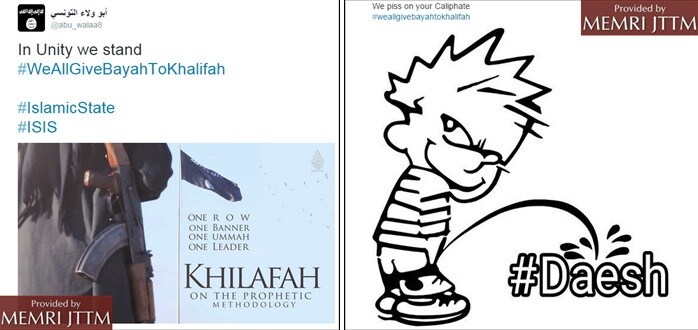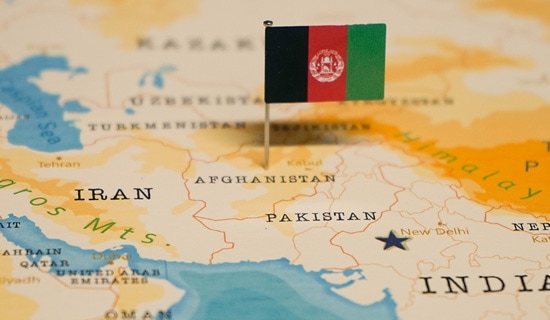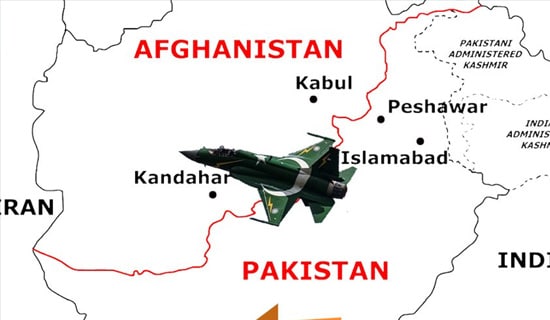The following report is a complimentary offering from MEMRI's Jihad and Terrorism Threat Monitor (JTTM). For JTTM subscription information, click here.
On August 20, 2015, online supporters of the Islamic State (ISIS) initiated a new hashtag calling for all Muslims to pledge allegiance to ISIS leader Abu Bakr Al-Baghdadi. However the attempted campaign didn't catch on due to the activity of anti-ISIS online activists who hijacked the hashtag in order to disrupt the usually effective ISIS media apparatus. Through the activity known as "trolling," these anti-ISIS accounts are actively waging a war against ISIS online activists by spreading ridiculous and offensive material through the same distribution channels.

Pro-ISIS account using the hashtag to the left. To the right, an anti-ISIS response to the hashtag with the caption: "We piss on your Caliphate."
ISIS media apparatus have been known to use all available functionalities of social media platforms to spread their message. The use of hashtags is extensive and constant, rendering material easily accessible and enabling supporters to join forces and share a common message.
However, ISIS media efforts have been the target of disruption by online anti-ISIS communities, sometimes supported by western governments, in addition to the censorship efforts of the social media platforms themselves. Numerous "troll" accounts have flourished online, spamming the ISIS hashtags and rendering the propaganda inefficient.
.jpg)
An anti-ISIS account responds to an ISIS supporter "All Muslims love ISIS! Oh wait, no we don't."
Only a few hours after its creation, the hashtag #WeAllGiveBayahToKhalifah ("We all pledge allegiance to the caliphate") was massively "trolled," a term used to designate the act of deliberately posting offensive and provocative content in an attempt to upset, disturb, or undermine an online exchange. Dozens of online "troll" accounts have appeared on Twitter aimed specifically at ISIS media accounts. The accounts have the sole purpose of undermining the propaganda effort via the dissemination of material specifically offensive to the Salafi Muslims population to whom the message is dedicated; for instance by the sharing of sexually explicit images or "fake" pictures mocking ISIS fighters. The twisted, offbeat humor combined with digitally manipulated images creates a disagreeable user experience for the pro-ISIS Twitter crowed. Female supporters and activists, who have played an important part in ISIS media activity, seem to be particularly targeted by online trolls, who send them pictures of a sexual nature (such as close up shots of male genitals) and other such pictures, accompanied by insulting and offensive texts. It should be considered that the ultra-conservative nature of the pro-ISIS community makes it particularly vulnerable to such provocation. Islamic themes are also very common subjects of mockery, such as women covered with a full veil.
.jpg)
The hashtag was used and translated in several languages, here in Arabic: "I pledge allegiance to the Caliph of Muslims"
While the trolling and spamming of individual accounts appears to yield low success, because the troll accounts can be simply blocked, it appears that these undermining activities conducted on hashtags are quite successful. Indeed, hashtags are meant to cover a topic and to bring together accounts that may not be otherwise connected, therefore a hashtag can easily be targeted, and if it is massively "attacked" by trolls it rapidly loses its original intent.
.jpg)
.jpg)
The Al-Battar pro-ISIS media group relayed the campaign and distributed a banner promoting it. It also shared the message from the French account of the Al-Battar media group promoting the hashtag in French "Brothers and Sisters spread the allegiance to your Caliph."
The following is an overview of the activity on Twitter of the hashtag #WeAllGiveBayahToKhalifah. A similar hashtag in French was also created to mirror the English one, #NousPrêtonsAllégeanceAnotreKhalifa [We pledge allegiance to our Caliphate], with similar results.
On August 20 at 3PM a Turkish ISIS supporter account (@DarulHilafe8) launched the initial hashtag. Within 3 hours, the hashtag had been used over 340 times by ISIS accounts in Turkish. An hour after it was started, the hashtag was picked up by the official English account of the pro-ISIS media group Al-Battar (@BMF_IS145). They spread the hashtag, and shared an accompanying image promoting the hashtag campaign. The media group's involvement immediately raised awareness of the campaign among supporters, but also triggered the response. Just 3 hours after the campaign started, the hashtag was being used by anti-ISIS activists to undermine the effort, and during the fourth hour of its existence an estimated 30% of the messages using the hashtag were anti-ISIS. After 24 hours, the percentage of anti-ISIS messages using the hashtag was well over 50%.
Over the course of its existence (the hashtag is still usable but its usage is negligible) the hashtag was used over 2,000 times in 4 days. More than half of these tweets were of a negative anti-ISIS nature. The total number of accounts using the hashtag is estimated between 500 and 600, which suggests that fewer than 400 pro-ISIS accounts actively engaged in the campaign. While a high estimate of over 800,000 accounts may have been reached by the campaign, it should be noted that among the ten most influential accounts (the ones with the most followers), all were satirical or anti-ISIS accounts. All the above numbers are valid for the similar hashtag in French in a proportion of 15:100.
In conclusion, the hijacking of the pro-ISIS hashtag by anti-ISIS troll accounts appears to have limited the reach of the media campaign. The numbers also indicate the relative weakness of the potential reach of the ISIS campaign beyond the first circle of ISIS activists. Hashtags enable a specific group to break out of the social network to which they belong, and to contact accounts outside of their circle. However, troll accounts and real accounts share many identical network links, which contains the message spread to a relative small circle of initiates. Impeding the ISIS media effort to reach out through trolling appears to have achieved its goal, especially in an environment where no mainstream media relayed the information.
.jpg)
.jpg)
.jpg)
Example of anti-ISIS troll messages. The more sexually explicit content was intentionally omitted here.





